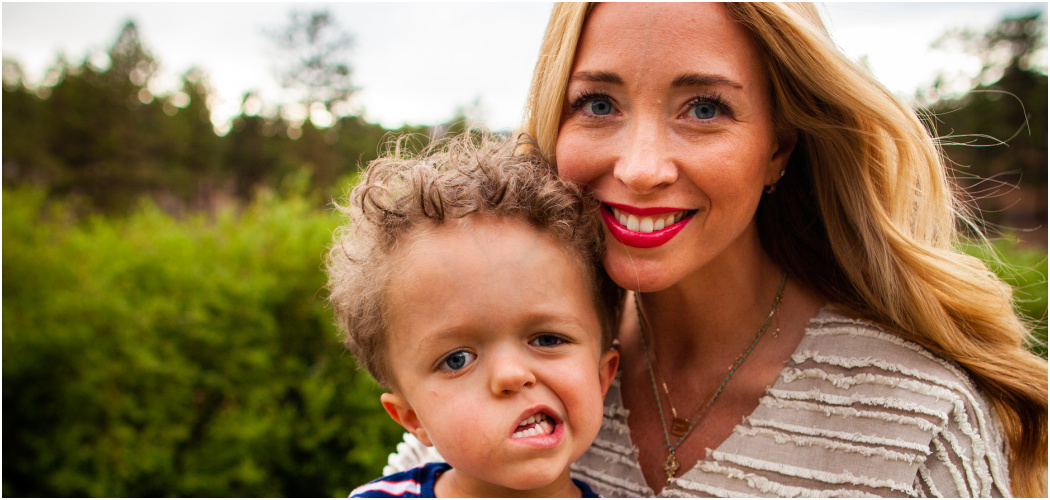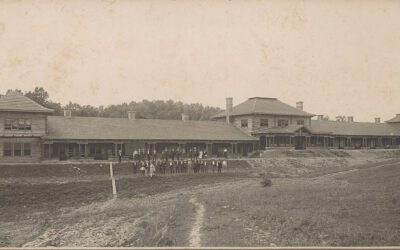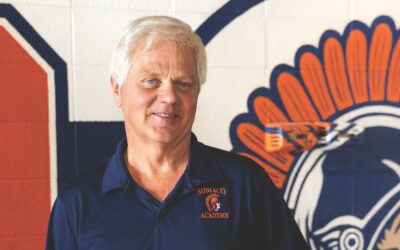There’s an ancient Zen saying: “The deeper sorrow cuts into your soul, the more joy you can contain.” Let it be known, Kelly Stuckey and her six-year-old son Everett have souls full of joy. But carving out that space has not been an easy journey.
In 2012, Fort Smith native Kelly Cooper married Zac Stuckey of Fayetteville. He’d proposed to her at Top of the Rock in New York City, in what Kelly says was a typically grand gesture. Zac had a deep sense of romance.
He was a graphic designer in marketing. Kelly had recently discovered her passion for cutting and styling hair. A year into their marriage, they opened Crown Beauty Bar in Fayetteville, which Kelly ran day to day, while Zac managed the marketing and business side. That salon was their first baby.
Little lion man
But an actual baby was taking much longer. After three years of trying, just weeks before they were about to start fertility treatments, they conceived. “My whole pregnancy was wonderful,” Kelly says. “Just so smooth. It couldn’t have gone better.”
Delivering the baby, however, did not go smoothly. After forty-six long hours of labor, culminating in an emergency C-section, Everett Price Stuckey came into the world. He was a beautiful, healthy baby, with a larger-than-average head that had caused her labor complications. It was the only difference anyone noticed.
Throughout the pregnancy, Kelly had been dreaming of lions, and unprompted one day, Zac had said he wanted a lion in the nursery. When they discovered the name Everett meant ‘brave’ like a lion, it felt like a sign.
“A little unusual”
Two days later, bags packed, Kelly and Zac were waiting to take Everett home when the on-call pediatrician walked in and asked if they’d noticed that their new son looked “a little unusual.”
They immediately bristled, offended on his behalf. “I said to her, ‘What do you mean, “unusual-looking”? He’s a newborn. I think he’s kinda perfect,’” Kelly says.
The pediatrician apologized, then explained that Everett’s limbs were not quite in the usual proportions; he might have dwarfism. But the Stuckeys thought she was crazy. No one else in their family had the condition. “We thought, ‘What the heck are you talking about? No!’” Kelly says. “We knew nothing about it. We hadn’t seen any of the shows. We thought, ‘This lady is absolutely mistaken.’”
But their own pediatrician took it seriously a couple days later. He recommended they take Everett to Arkansas Children’s Hospital for a rare blood test that would confirm or rule out dwarfism.
Five weeks later, it was confirmed: Everett was a little person. Kelly says that after she ended the call, she sat there holding Everett and crying. “I just sat and cried and cried, because I thought, ‘This is so foreign to me. And people can be so cruel. What is his life going to be like?’” she says. “I just had to grieve all the expectations. I’m fairly tall. I was a basketball player, as was my dad. You have to let go of the visions you had, you know?”
She says that besides major health complications and risks associated with dwarfism, the stigma remains pervasive. “Because people are obsessed with how your baby grows and how big, and what are they going to be, and what are they going to look like,” Kelly says.
When the Stuckeys began opening up to friends about Everett’s dwarfism, many people urged them to pray for healing. That struck Kelly oddly. “He was born, and I was just enamored with him,” she says. “It’s really hard to look at him and think, ‘Oh, there’s something wrong with him. He needs to be healed or fixed.’”
Kelly struggled to reconcile her beliefs. “I know God is good no matter what, but I felt great pressure that my faith had to be big enough for him to be ‘healed’ while also accepting that Everett is perfect the way he is.”
That perfection included the crooked smile that grew more pronounced as he grew. Technically, it’s a facial palsy, but with his giant blue eyes and curly hair, Kelly says it’s one of her favorites of his features.
Dancing with destiny
The diagnosis meant frequent doctor visits, MRIs every three months, physical and speech therapy. The MRIs were to monitor for spinal compression, which affects about one-in-four children with dwarfism. Spinal fluid can build up in the brain, causing hydrocephalus, a condition that can lead to severe complications including brain damage.
At fifteen months old, Everett’s MRI suddenly showed spinal compression. He’d need to widen the holes at the base of his skull to prevent hydrocephalus. But no one in Arkansas had performed the needed surgery on a child with dwarfism.
The Stuckeys found a surgeon with expertise in this area via, of all things, Dancing with the Stars.
“At that time, there was a little person [Terra Jolé Odmark of Little Women: LA] on Dancing with the Stars.” Friends urged Kelly to watch. By chance, the night Kelly watched, Terra Jolé spoke about her daughter having the same surgery. Watching the Little Women series to learn more, Kelly found Dr. Moise Danielpour of Cedars-Sinai in Los Angeles, who was seeing several people a month with dwarfism.
A God thing
They reached out to him. As soon as Danielpour read Everett’s MRI, he called the Stuckeys personally, urging them to get Everett to LA as soon as possible, because it was imperative he have the surgery soon.
The surgery was a glowing success. Because of Everett’s delicate condition, the family stayed in LA almost a month until he was cleared to go home to Arkansas.
“Dr. Danielpour was wonderful in every way,” Kelly effuses. “And I’m not kidding, his name translates to something having to do with lion tamer! Coming across him, it was totally a God thing.”
Another miracle: “My insurance paid for the whole thing,” she says, citing an insurance statement for nearly $300,000. “I couldn’t believe it.”
Crisis averted, their lives still required deep commitment to helping Everett grow while meeting his special needs, including ongoing physical and speech therapy.
Small business owners of by then two high-traffic salons, Zac had stepped up to carry more weight for their businesses as Kelly’s focus was largely consumed by Everett. At Zac’s urging, in spring 2019 they bought a third business.
Overwhelming grief
Then, just two months later, tragedy struck the family.
Sporting his best-on-the-market helmet, the morning of July 21, 2019, Zac was riding out of their neighborhood on his powerful new BMW motorcycle. In a flash, he took a curve too hard, lost control and ran into a box truck. He was killed instantly.
It was his 41st birthday. Everett was three.
“Zac loved to have nice things, and he loved vehicles,” Kelly says. “But he was a new rider. He was on a big, beautiful BMW, and he lost control. And that was all it took.”
Grief overwhelmed her.
Kelly says, “We had the sweetest marriage. We actually really were best friends. We got along so well. I truly felt like we were on the same page. And he was such a great dad.”
She calls the outpouring of love and support for her and Everett from their community of friends and family “huge and absolutely incredible.” It meant a lot. But over time, Kelly started to find even the well-meant support overwhelming.
She now realizes grief isn’t something that needs to be fixed. “People just really want to help you feel better, to help make everything right,” she explains carefully. “And there are very nice, comforting things that can be done. But then there comes a point where a person just is going to be sad and miserable for a little bit. And you kinda need to let them be sad and miserable.”
The world turned upside down
Soon, the small business owner, newly a widow, with a young special needs child, ran into a whole new added layer of stress: 2020. “My world was flipped upside down in July of 2019,” Kelly says. “Then, seven months later, when the whole world was flipped upside down, it was like a double whammy for me. I’d think, ‘Am I alive? Is this real life? Am I going to wake up from this?’”
During the pandemic, Kelly sold all three businesses. She and Everett moved to Bentonville, where at Everett’s new school, the director of admissions happens to be the only other little person they know locally.
The best kid in the world
Asked to describe what Everett is like at six, Kelly’s voice softens, all stress leaving it.
“He’s the best kid in the world, and so smart. He already reads! He’s the most sensitive and empathetic child. He looks out after people. He’s very kind. He’s very positive and joyful,” the proud mama shares.
Like his dad, Everett loves video games. He also has a love of soccer; as his team’s goalie, her lion-hearted son can contribute without having to keep up with longer-legged kids on the field.
Healthy, safe and loved
Kelly’s finding ways to cope with the dwarfism stigma. She speaks out when she sees little people being degraded online, something they have often grown desensitized to. And she tries to have compassion for those who don’t understand it.
What helped was realizing most people only see little people in Hollywood, where they’re usually mythical creatures: Munchkins, Oompa Loompas, Ewoks, dwarves, elves. The dearth of positive, real-life portrayals means people are often either scared or think it’s funny when they meet little people in real life. “There are so many misconceptions, and they’re often treated in less humane ways than average people,” she says.
That term, “average,” is key. It’s the preferred term in the little people community, rather than “normal.” Kelly says, “The opposite of normal is very negative. I never want to see Everett as abnormal.”
She’s not decided what comes next; there’s time to figure that out as she heals from the pain of loss. “My hope for us—the words Everett and I use a lot—are safe, healthy and loved. I just want us to have healthy, safe relationships where we feel really loved, and to have solid faith that guides us,” she says. “And I want him to have confidence and peace about who he is, not question how God made him or how people receive him. I want both of us to have that confidence and peace about who we are.”




